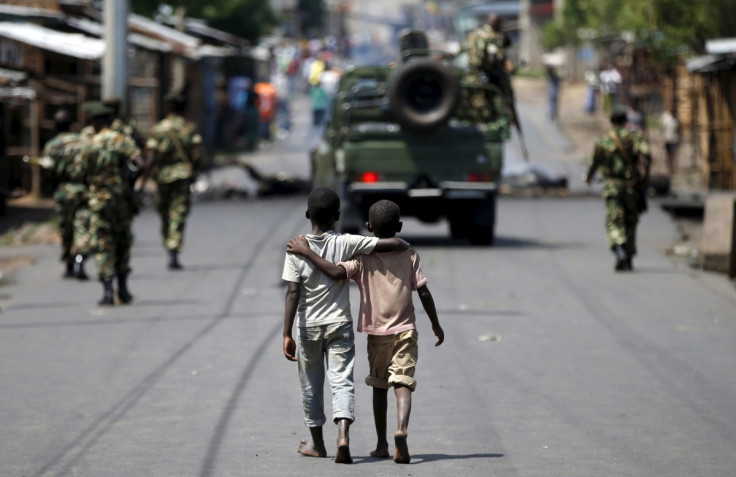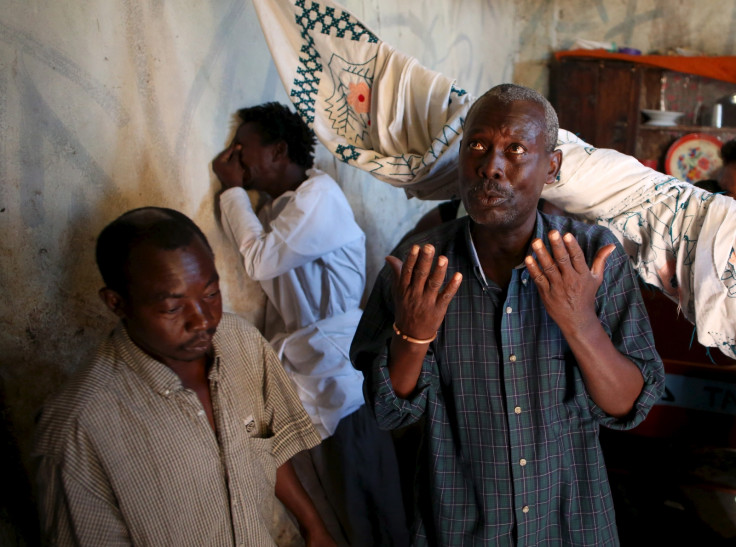Burundi: Civil society rejects government claims 'violence is not ethnically motivated'
Opposition tells IBTimes UK Burundi's forces carry out targeted killings of members of the Tutsi community.

Burundi's civil society and opposition have rejected government claims that the unrest and violence is not ethnically motivated.
The Burundian Minister of Human Rights, Social Affairs and Gender, Martin Nivyabandi on Tuesday (5 July) rejected claims made by United Nations (UN) human rights chief Zeid Ra'ad Al Hussein last month, saying they were "negative and false media reports about inter-ethnic relationship in our country".
According to the Minister, the UN "has endorsed the false view" that Burundi's security forces carry out targeted killings of members of the Tutsi community.
In a statement sent to IBTimes UK, Nivyabandi highlighted the ethnic "inclusiveness" of Burundi's institutions, in line with the Arusha Accord, the Unity Charter and the Constitution. "The Government of Burundi reiterates its determination to continue to uphold the unity of Barundi (the people of Burundi) and protect its citizens," the minister said.
Civil society: Rights situation deteriorated in 2016
On 4 July, meanwhile, 14 civil society organisations sent an open letter to Chad's President Idriss Deby – who took over the post of African Union (AU) chairman in January – urging the AU and the international community to remain committed to prevent a new genocide.
"We hope that your commitment to human rights and the fight against impunity as displayed by the
cooperation of your government to the prosecution of former Chadian President Hissène Habré who was tried and sentenced for similar cases as those committed in Burundi, will motivate the African Union to give the same support to the people of Burundi who are victims of the ongoing repression committed by a self-proclaimed regime," the organisations wrote in its memorandum.
Spectre of past ethnic wars
The increased violence and incitement echo past Hutu-Tutsi conflicts in the country with an ethnic make-up that is 85% Hutu, 14% Tutsi and 1% Twa. Conflicts include the slaughter of between 80,000 and 200,000 Hutus by the Tutsi army in 1972, and the civil war that ran from 1993 to 2005, when some 300,000 people were killed.
During that time, neighbouring Rwanda also witnessed the death of at least 1 million Tutsis and moderate Hutus who refused to take part in the killings of the Tutsis.
The group highlighted difficulties faced by civil society groups in monitoring human rights violations due to suspension of organisations – with staff fleeing the country and bank accounts frozen. It also outlined a deterioration of human rights and humanitarian situations during the first semester of 2016.
In its letter, the collective highlighted a series of alleged violations, including assassinations - Local NGO Aprodh reported 179 deaths identified between 1 January and 31 May alone. These followed raids by security forces, and clashes between them and rebel groups – arbitrary arrests, enforced disappearances, extortion, torture as well as rape and sexual violence.
It also claimed that "the fear of an implosion of ethnic violence remains high because of the prevailing and ongoing ethnic hate speech and teachings undertaken by the CNDD-FDD senior officials and the de facto institutions that run the country."
The "often signed, published or stated hate-speech messages inciting to violence" were directed towards Tutsi community members, Hutus opposed to President Nkurunziza's third term, Rwandan nationals and Rwanda 's President Paul Kagame.
Cnared: 'Today, the repression is almost selective'
When asked to comment on Nivyabandi's comments, a spokesman for the Council for the Observance of the Constitution, Human Rights and the Arusha Peace Accord (Cnared), an alliance-in-exile of 37 opposition movements and parties, said the government of President Pierre Nkurunziza was wrong in claiming there is no ethnic aspect to the conflict.
"The government denying the allegations is good politics, but the facts are there. Hardly a day passes without there being disappearances, arbitrary arrests or people tortured," Cnared spokesman Pancrace Cimpaye told IBTimes UK.
While Cimpaye highlighted a "difference" in the modus operandi fuelling the unrest, he described how certain segments of the population were allegedly targeted.

"The culprits would carry out the crimes in the full light of day for everyone to see – with bodies lying in the streets – but now they do it more discreetly. Yet, for families who lost their loved ones and families of young people arrested, especially young Tutsi, the facts are there," he said over the phone. "Today, the repression is almost selective: those targeted are essentially – albeit not exclusively – the Tutsi component whether it's within the army or the youth. We cannot deny the ethnicisation of the crisis."
These comments come a week after Hussein voiced fears the deadly political violence that has rocked the country for more than a year could escalate into ethnic conflict between the Hutu majority and Tutsi minority – in a report he delivered to the UN Human Rights Council on 29 June.
"In the south of the country, I have also been informed of speeches by members of the Imbonerakure amounting to incitement to violence against political opponents, with strong ethnic overtones," the UN chief alleged, referring to the youth wing of Nkurunziza's ruling CNDD-FDD party. The government has repeatedly rejected the accusations as without merit.
© Copyright IBTimes 2025. All rights reserved.






















